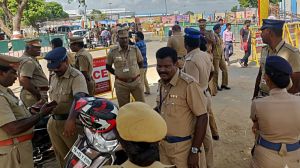Do remember Rwanda
The killings in Kenya have gone rapidly beyond the bitterness of a stolen election.

Kofi Annan has rarely been blunter, more heartfelt or more anguished in his appeal. Kenya, he told its leaders on Tuesday, was in turmoil, its people suffering, its land untilled, its tranquillity rapidly descending into chaos. The former United Nations Secretary-General knows that he is racing against time in his desperate attempt to halt the downward spiral. No one, he said, could stand by and allow the violence and the killings to go unchecked. Kenya8217;s leaders had to lead, to take charge and to act with urgency.
What he and the world have seen is the terrible example of what happened before, just across Kenya8217;s borders. At the beginning of April 1994, Rwanda similarly stood at the abyss. Gangs of youths, armed with clubs and machetes, roamed the streets. Families were slaughtered in the streets, burnt alive in churches and refuges, hunted down and clubbed to death. French, Belgian and US troops tried, feebly, to intervene but were overwhelmed. In hindsight, Mr Annan and the UN realised that they failed to heed the alarm from Kigali. They did too little, too late.
The killings in Kenya have gone rapidly beyond the bitterness of a stolen election. Ancient tribal animosities, stirred by feuding politicians, have revived historic arguments over land and grazing rights, inflamed the loathing among the rural poor for the corrupt elites, shattered the tolerance engendered by prosperity and stability and again set Kikuyus against Luos, Kalenjins and others who resent the dominant tribe and voted for Raila Odinga, the defeated presidential candidate. Kenya does not have the bloody history of Hutu and Tutsi hatred; but in too many chilling ways the descent into violence is as rapid and random as the apocalypse in Rwanda.
Mr Annan8217;s warnings are addressed as much to the outside world as they are to President Kibaki and Mr Odinga. They could not be more urgent. Paralysed by indecision and conflicting interests, Western leaders have done little except urge restraint, hint at a suspension of aid and draw up plans to evacuate their nationals. It is time that George Bush, Gordon Brown and European leaders were more outspoken in their demands, robust in their diplomacy and forthright in their denunciations of the terrible events threatening to ruin not only Kenya but also, by that example, democracy and prosperity in much of Africa.
From an editorial in 8216;The Times8217;, London, January 30
- 01
- 02
- 03
- 04
- 05































